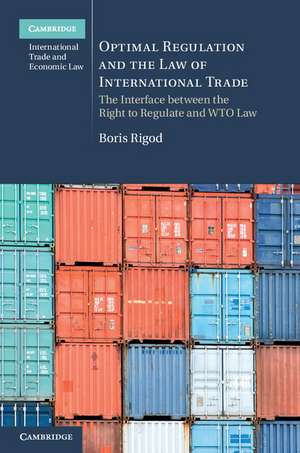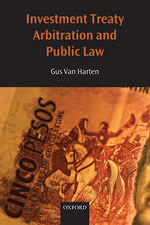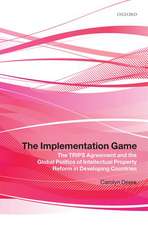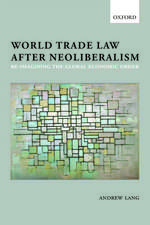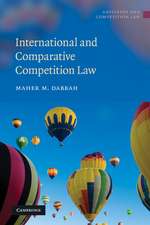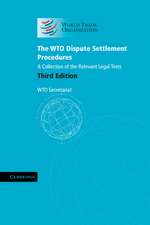Optimal Regulation and the Law of International Trade: The Interface between the Right to Regulate and WTO Law: Cambridge International Trade and Economic Law, cartea 18
Autor Boris Rigoden Limba Engleză Hardback – 12 noi 2015
Din seria Cambridge International Trade and Economic Law
-
 Preț: 177.62 lei
Preț: 177.62 lei -
 Preț: 271.22 lei
Preț: 271.22 lei -
 Preț: 284.39 lei
Preț: 284.39 lei - 23%
 Preț: 692.51 lei
Preț: 692.51 lei -
 Preț: 177.47 lei
Preț: 177.47 lei - 14%
 Preț: 699.45 lei
Preț: 699.45 lei -
 Preț: 216.93 lei
Preț: 216.93 lei - 14%
 Preț: 698.61 lei
Preț: 698.61 lei -
 Preț: 321.52 lei
Preț: 321.52 lei -
 Preț: 272.97 lei
Preț: 272.97 lei -
 Preț: 323.05 lei
Preț: 323.05 lei - 14%
 Preț: 868.71 lei
Preț: 868.71 lei -
 Preț: 292.88 lei
Preț: 292.88 lei -
 Preț: 288.42 lei
Preț: 288.42 lei - 23%
 Preț: 641.51 lei
Preț: 641.51 lei -
 Preț: 178.30 lei
Preț: 178.30 lei -
 Preț: 432.05 lei
Preț: 432.05 lei -
 Preț: 320.17 lei
Preț: 320.17 lei - 23%
 Preț: 753.36 lei
Preț: 753.36 lei - 11%
 Preț: 636.34 lei
Preț: 636.34 lei - 23%
 Preț: 616.00 lei
Preț: 616.00 lei - 14%
 Preț: 703.74 lei
Preț: 703.74 lei -
 Preț: 285.37 lei
Preț: 285.37 lei - 14%
 Preț: 699.45 lei
Preț: 699.45 lei - 14%
 Preț: 786.62 lei
Preț: 786.62 lei -
 Preț: 314.83 lei
Preț: 314.83 lei - 14%
 Preț: 895.68 lei
Preț: 895.68 lei - 14%
 Preț: 708.14 lei
Preț: 708.14 lei - 14%
 Preț: 1015.31 lei
Preț: 1015.31 lei - 14%
 Preț: 896.85 lei
Preț: 896.85 lei -
 Preț: 405.20 lei
Preț: 405.20 lei -
 Preț: 322.51 lei
Preț: 322.51 lei - 14%
 Preț: 727.26 lei
Preț: 727.26 lei -
 Preț: 283.79 lei
Preț: 283.79 lei - 14%
 Preț: 785.48 lei
Preț: 785.48 lei
Preț: 727.59 lei
Preț vechi: 846.03 lei
-14% Nou
Puncte Express: 1091
Preț estimativ în valută:
139.24€ • 151.20$ • 116.96£
139.24€ • 151.20$ • 116.96£
Carte tipărită la comandă
Livrare economică 22 aprilie-06 mai
Preluare comenzi: 021 569.72.76
Specificații
ISBN-13: 9781107116122
ISBN-10: 1107116120
Pagini: 322
Ilustrații: 16 b/w illus. 5 tables
Dimensiuni: 152 x 229 x 19 mm
Greutate: 0.6 kg
Editura: Cambridge University Press
Colecția Cambridge University Press
Seria Cambridge International Trade and Economic Law
Locul publicării:New York, United States
ISBN-10: 1107116120
Pagini: 322
Ilustrații: 16 b/w illus. 5 tables
Dimensiuni: 152 x 229 x 19 mm
Greutate: 0.6 kg
Editura: Cambridge University Press
Colecția Cambridge University Press
Seria Cambridge International Trade and Economic Law
Locul publicării:New York, United States
Cuprins
Foreword Petros C. Mavroidis; Introduction; Law and economics in a nutshell; Part I. Optimal Regulation and International Trade Law - Theory: 1. Introduction to Part I; 2. Optimal regulation; 3. Deviations from optimal regulation; 4. Deviations from optimal regulation and the role of international trade agreements; 5. Conclusion to Part I; Part II. Optimal Regulation and International Trade Law - Application: 6. Introduction to Part II; 7. Domestic regulation and the GATT; 8. Domestic regulation and the TBT Agreement; 9. Domestic regulation and the SPS; 10. Conclusion to Part II.
Descriere
This book applies a law and economics methodology to enquire into the interface between regulation and international trade law.
